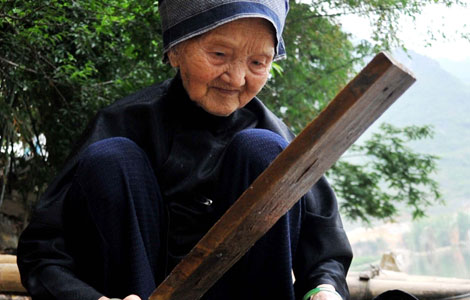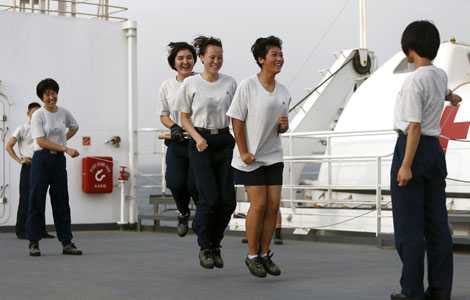Official calls for improved elevator safety
Updated: 2013-09-10 01:24
By Wang Qingyun (China Daily)
|
|||||||||||
Quality-inspection author-ities have called for the training of more elevator maintenance professionals and urged greater public awareness of elevator safety issues, after a string of deadly accidents that involved malfunctioning equipment.
The rapid increase in the number of elevators has posed a great challenge to their maintenance, said Chen Gang, deputy head of the General Administration of Quality Supervision, Inspection and Quarantine.
Chen made the remarks on Monday at the start of a weeklong program on promoting elevator and escalator safety.
The number of elevators and escalators in China is increasing 20 percent annually, reaching 2.45 million by the end of 2012, he said.
The increase made China first in the world in the number of elevators and escalators in use, their production and growth, he said.
But the country currently faces a shortage of such personnel, and the administration is under pressure to resolve the problem after a string of elevator accidents that have killed passengers.
In one such case that shocked the country, a 24-year-old nursing intern in Shenzhen was decapitated in May while stepping out of an elevator that suddenly malfunctioned, stopped between floors and then moved sharply up and down. Investigations showed the elevator's maintenance workers had not followed safety management regulations.
Chen said the incidence of accidents in China is similar to that in developed economies. In 2012, the rate of accidents was 0.15 per 10,000 machines, with a death rate of 0.11 per 10,000 machines.
But he also said that the safety of elevators is an issue that deserves attention.
"The dramatic increase in elevators in use, the aging of equipment and the heavy load on elevators and escalators threaten their safe operation," he said.
Cao Yiding, an official of the administration in charge of elevator safety inspection, said regulations stipulate that an elevator should be checked every 15 days, but not all elevators are regularly maintained.
"It is because of the rapid increase (in elevators) and the lack of time to train more professional maintenance workers," Cao said, adding that the lack of maintenance was behind most elevator problems.
Fan Kun, director of a special equipment testing institution responsible for examining all elevators and escalators in Beijing's Chaoyang district, said that after receiving reports submitted by companies that maintain the elevators, the institution "often found in the follow-up examination that the condition of the elevator differed from what they said in the report".
"Sometimes, some maintenance workers with a heavy workload would just skip some tests and fill in fake results," he said.
He said that the district has more than 40,000 elevators and escalators, and the number has been increasing at a rate of more than 2,000 annually, creating huge workloads for maintenance companies.
"We usually have to work extra hours and on weekends to finish the inspections," he said.
Cao, the elevator safety inspection official, said that the public's reluctance to pay for elevator maintenance is another important reason for the lack of maintenance.
"On many occasions, residents in a building refuse to pay for the maintenance of elevators, which are for public use, so the company maintaining the building cannot collect enough money to hire maintenance companies to do the job."
Li Zhiqiang, manager of the existing installations department of Schindler China's Beijing Branch, said the public is not fully aware of the importance of maintenance in keeping the machines safe.
"People don't pay attention to the safety of the elevators until something goes wrong," he said.
"Sixty percent of households in a residential community need to sign an agreement before they can use their maintenance fund to fix the elevator that needs an overhaul badly. But they often fail to come to an agreement, letting the elevator age and become unreliable."
Related Stories
Five killed in elevator accident 2013-08-16 13:24
Otis Elevator shifts focus to maintenance, repair 2013-08-12 11:05
Elevator safety 2013-07-22 17:01
China mulls law to ensure elevator safety 2013-06-26 21:15
Today's Top News
Serious breach limit set for online rumors
DPRK leader has a baby daughter: Rodman
2 dead after S China school blast
China will stay the course on sustainable growth
Syria issue should be handled within UN framework
Chinese president arrives in Uzbekistan for visit
China's inflation slows to 2.6%
Belgian PM 'confident' in China's economy
Hot Topics
Lunar probe , China growth forecasts, Emission rules get tougher, China seen through 'colored lens', International board,
Editor's Picks

|

|

|

|

|

|





